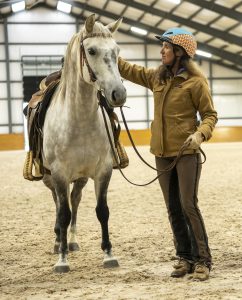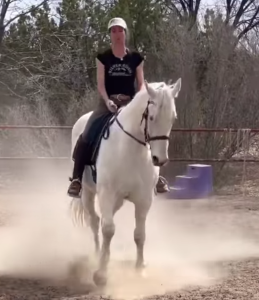 Editor’s Note: Best Horse Practices Summit presenter Katrin Silva grew up riding dressage in Germany before moving to the United States at age 19 to learn to ride Western. She’s been riding both disciplines for the last 20 years and is a regular guest columnist for Cayuse Communications. The author of Dressage for All of Us: How to Help Any Horse Become a Happier, More Responsive Riding Partner lives in New Mexico where she works with dressage and Western clients.
Editor’s Note: Best Horse Practices Summit presenter Katrin Silva grew up riding dressage in Germany before moving to the United States at age 19 to learn to ride Western. She’s been riding both disciplines for the last 20 years and is a regular guest columnist for Cayuse Communications. The author of Dressage for All of Us: How to Help Any Horse Become a Happier, More Responsive Riding Partner lives in New Mexico where she works with dressage and Western clients.
Katrin’s upcoming book is Riding with Feel: A Guide for the Rest of Us, due in Summer 2022. Read more about that here.
Katrin writes:
We juggle. We cook dinner while watching the news and answering emails. We text while driving. We’ve gotten good at doing several things at once, but doing none of them well. This is bad news for horsemanship, which is an exercise in sustained single-tasking.

Katrin at the BHPS 2021 Summit
Unlike driving while distracted, riding while distracted won’t lead to deadly crashes. But it’s still damaging because it hurts the relationship. When our attention wanders, we can’t focus on our horses enough to feel their movement, their breathing, their energy. If we want our horses to pay attention to us, we need to be paying attention to them, giving them undivided, full attention.
Our cell phones are the most obvious reason we find this difficult. Emails, texts, and breaking news interrupt whatever else we are doing, which makes our attention spans shorter and shorter. Like Pavlov’s dogs, we are conditioned to respond to beeps and pings with an urge to check what’s new. The solution to this problem is just as obvious: stay away from your phone while you’re with your horse. Leave your phone in the tack room, or, if you take your phone with you for safety reasons, silence it and forget about it. Once you are with your horse, nothing matters more than the notifications you get from him.
Other people can also become a source of distraction. Conversations with our barn friends are an enjoyable part of horse life, but it’s still important to check in with our horses on a regular basis whenever we’re with them. And while it would be rude to ignore what our teacher is telling us when we take lessons, with the other ear we still need to listen to what our horse is telling us.
Internal triggers distract us, too. Anxiety or fear welling up from inside our minds can do just as good a job of keeping us from focusing on our horses as any ringtone. On a good day, it stays in the imaginary bubble around me and my horse for most of my ride. On a not so good day, I focus on my horse, then I worry about whether the person who is watching me ride thinks I suck, then I focus on my horse again, then I beat myself up for a transition that could have been smoother, and so on.
 How can we learn to focus more consistently? Berating ourselves for getting distracted makes things worse. Rather than sliding into self-criticism, I gently redirect my attention back to where it belongs.
How can we learn to focus more consistently? Berating ourselves for getting distracted makes things worse. Rather than sliding into self-criticism, I gently redirect my attention back to where it belongs.
Next time you ride, notice what is going on inside your head. It’s an interesting place to visit. Are thoughts or nagging worries about your non-horse life creeping in? Are you afraid your horse might spook? Are you comparing yourself to other riders in the arena? Are you judging yourself, or anyone else? There is no right or wrong answer. Just notice.
Whenever you feel your mind stray from the here and now, remind yourself to be exactly where you are: with a sensitive being who has much to teach you.
Taking a moment to feel grateful for being with a horse also helps put things in perspective. Riding is, for most of us, something we choose to do, not something we have to do. It’s also something we are fortunate we get to do, in more ways than one. The most important kind of privilege is the one our horses grant us. Every time I swing my leg over the back of a horse, I feel a sense of awe, along the lines of “Wow. This powerful creature allows me to climb on top of him. This flight animal, whose only defense from predators is running away, allows me, a human and technically a predator, to guide and direct him.”
It’s easy to forget what an extraordinary state of affairs this is. Horses don’t have to tolerate us anywhere near them, much less on their backs. Yet most of them do, most of the time. What a privilege! A horse’s trust in us is astonishing. It humbles me to feel it, every day. It makes me want to earn that trust, rather than to waste the time with meaningless distractions. It makes me want to tune in, not out. Take a moment to breathe deeply and reflect on how lucky you are to be here. Distracted riding means you miss opportunities to learn and grow.
At the same time, focusing on your horse should not deteriorate into obsessive self-monitoring. Keep your focus soft around the edges. Trying too hard can backfire. Just notice the feedback your horse gives you. Notice how he feels underneath you. Adjust the feedback you give him based on his information. That’s all. There’s something to be said for working styles of horsemanship, where riders have something in addition to their horse to focus on, like negotiating an obstacle or following a cow. Obsessing about every stride is as wrong as tuning your horse out while you’re with him. Focus is good, but it needs to be a relaxed, flexible kind of focus, not a rigid, demanding one. Keep breathing. Keep your movements slow, your eyes soft.
Really good riding is only possible when we’re focused and relaxed at the same time. Developing our minds is a huge part of improving our horsemanship. It takes time and effort. It’s worth it.
Thank you for the reminder that being generous with ourselves opens us up to being generous with our horses! Well said!
Thank you, Kelly. So much of good horsemanship is mental and emotional. It’s stonishing how sensitive our horses are to what goes on in our heads.
Katrin, this is a beautiful piece. Absolutely lovely. Thank you.
AMEN!